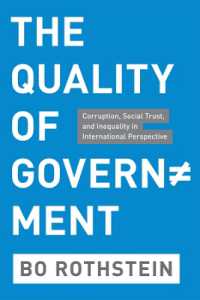Full Description
Even after a rise in gay and Black representation and production on TV in the 1990s, the sitcom became a "generic closet," restricting Black gay characters with narrative tropes.
Drawing from 20 interviews with credited episode writers, key show-runners, and Black gay men, The Generic Closet situates Black-cast sitcoms as a unique genre that uses Black gay characters in service of the series' heterosexual main cast. Alfred L. Martin, Jr., argues that the Black community is considered to be antigay due to misrepresentation by shows that aired during the family viewing hour and that were written for the imagined, "traditional" Black family. Martin considers audience reception, industrial production practices, and authorship to unpack the claim that Black gay characters are written into Black-cast sitcoms such as Moesha, Good News, and Let's Stay Together in order to closet Black gayness.
By exploring how systems of power produce ideologies about Black gayness, The Generic Closet deconstructs the concept of a monolithic Black audience and investigates whether this generic closet still exists.
Contents
Acknowledgments
Introduction: Television in Black and Gay
1. Building and Rebuilding Generic Closets within the Black-Cast Sitcom Industry
2. Scripting the Generic Closet in the Writers' Room
3. Comedy, Laughter and the Generic Closet
4. Black Queens Speak: The Generic Closet, Black-Cast Sitcoms and Reception Practices
Conclusion: Trapped in the Black-Cast Sitcoms' Generic Closet
Appendix A: List of Black-Cast Sitcoms with Black Gay Characters
Appendix B: Interview Script for Black-Cast Sitcom Viewers
Appendix C: Interview Script for Industry Professionals
Bibliography
Index








